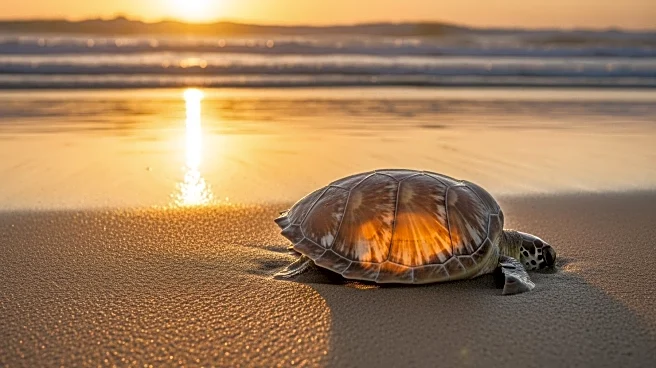What's Happening?
In Lagos, Nigeria, conservationists from the Greenfingers Wildlife Conservation Initiative successfully rescued and released three endangered sea turtles back into the ocean. These turtles were initially
caught by fishermen, who often view them as food due to a lack of awareness about wildlife conservation. The turtles were cared for at a sanctuary before their release, marking a significant effort in wildlife preservation. Nigeria, known for its rich biodiversity, faces severe threats to its wildlife, with 23 species classified as critically endangered. Illegal wildlife trafficking, driven by population growth and ignorance, exacerbates the situation. Conservationists like Chinedu Mogbo are working to reverse this trend by incentivizing fishermen to report turtle captures and nests, offering fishing gear as rewards.
Why It's Important?
The rescue and release of endangered sea turtles in Nigeria underscore the critical state of wildlife conservation in the region. Sea turtles play a vital role in marine ecosystems, and their declining numbers signal broader environmental challenges. The initiative by Greenfingers Wildlife Conservation highlights the urgent need for increased awareness and action to protect endangered species. This effort not only aids in preserving biodiversity but also fosters community engagement and education. By rewarding fishermen for conservation efforts, the initiative promotes sustainable practices that could lead to long-term ecological benefits. The situation in Nigeria serves as a microcosm of global wildlife conservation challenges, emphasizing the need for international cooperation and support.
What's Next?
Continued efforts by conservation groups like Greenfingers Wildlife Conservation Initiative are crucial for the survival of endangered species in Nigeria. The organization plans to expand its outreach and education programs to further engage local communities and fishermen. By increasing awareness and providing incentives, they aim to reduce illegal wildlife trafficking and promote sustainable fishing practices. The success of these initiatives could inspire similar conservation efforts in other regions facing biodiversity threats. Additionally, collaboration with international conservation bodies could enhance resources and support for local initiatives, potentially leading to more comprehensive strategies to combat wildlife endangerment.
Beyond the Headlines
The rescue of sea turtles in Nigeria highlights deeper issues of biodiversity loss and environmental degradation. The situation reflects broader global challenges in wildlife conservation, where economic pressures and lack of awareness contribute to species decline. Ethical considerations arise regarding the balance between human needs and wildlife preservation. Long-term solutions require integrating conservation into economic and social policies, ensuring that local communities benefit from sustainable practices. This approach could lead to a cultural shift towards valuing and protecting natural resources, fostering a more harmonious coexistence between humans and wildlife.









